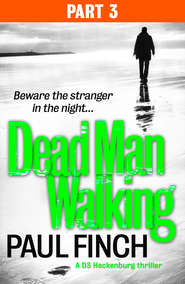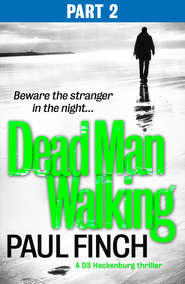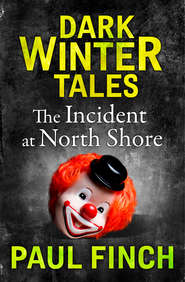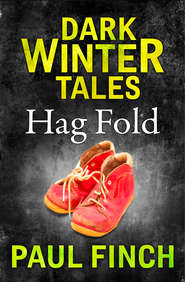По всем вопросам обращайтесь на: info@litportal.ru
(©) 2003-2025.
✖
Those They Left Behind
Автор
Год написания книги
2019
Настройки чтения
Размер шрифта
Высота строк
Поля
Those They Left Behind
Paul Finch
**A horror short story from #1 bestseller, Paul Finch. Part of the Dark Winter Tales series: unputdownable reads for cold winter nights…**Searching the stalls of Camden, 78-year-old Elsie becomes drawn towards a head on a top shelf – not a real head of course, but a good replica.As the stall holder takes ‘Old Bob’ off the shelf, Elsie realises that there is a body attached to the head and soon discovers that the mannequin was used to test the gallows each morning for executions.Returning the following day Elsie buys ‘Old Bob’ and takes him home. But in the days that follow, Elsie starts to act strangely…and those who know her are about to find out why.As the nights draw in, get hooked on this dark and suspenseful short story - the perfect read for fans of Mark Edwards and Peter James.
Those They Left Behind
Paul Finch
Copyright (#ulink_79b62931-a0c1-52c5-abc2-4185d7090218)
Published by Avon
An imprint of HarperCollinsPublishers
1 London Bridge Street
London SE1 9GF
www.harpercollins.co.uk (http://www.harpercollins.co.uk)
This ebook edition published by HarperCollins Publishers 2016
First published in paperback and hardback in Enemies at the Door by Gray Friar Press, 2012
Copyright © Paul Finch 2016
Cover design © Debbie Clement 2016
Paul Finch asserts the moral right to be identified as the author of this work.
A catalogue copy of this book is available from the British Library.
This novel is entirely a work of fiction. The names, characters and incidents portrayed in it are the work of the author’s imagination. Any resemblance to actual persons, living or dead, events or localities is entirely coincidental.
All rights reserved under International and Pan-American Copyright Conventions. By payment of the required fees, you have been granted the non-exclusive, non-transferable right to access and read the text of this e-book on screen. No part of this text may be reproduced, transmitted, down-loaded, decompiled, reverse engineered, or stored in or introduced into any information storage and retrieval system, in any form or by any means, whether electronic or mechanical, now known or hereinafter invented, without the express written permission of HarperCollins.
HarperCollinsPublishers has made every reasonable effort to ensure that any picture content and written content in this ebook has been included or removed in accordance with the contractual and technological constraints in operation at the time of publication
Ebook Edition © January 2016 ISBN: 9780008173753
Version: 2018-07-24
Contents
Cover (#uf14cd48d-f7e6-525b-8e2e-bf7d98c0dd3a)
Title Page (#u771c302a-67b8-5a4f-b4a3-5bf613950731)
Copyright (#ubf866846-86c6-5d0e-a6d5-5895cef74a7a)
Those They Left Behind (#uc79e5abb-9547-5135-a4ba-12ffd2fdad1c)
About the Author (#litres_trial_promo)
By the Same Author (#litres_trial_promo)
About the Publisher (#litres_trial_promo)
The Stables Market near Chalk Farm tube is well known across London as a centre of trendy fashion and alternative art, and as a stamping ground for counter-culture types. But it also has a reputation as a bazaar of the weird and wonderful. Numerous of its stalls may seem initially as if they’re selling only bric-a-brac, but look a little closer and you’ll find a bewildering array of curios; everything from tawdry jewellery to antique ironmongery, from Halloween masks to Easter bonnets, from pairs of mismatched gloves to veils of exotic silk. Useful workaday oddments like corkscrews, toilet brushes, photo frames and mousetraps, intersperse with the truly bizarre – a glass eyeball, a bird’s nest, a priest’s stole, a gramophone horn, a corn dolly, a stained lobotomy cap, an edible jockstrap, a pack of pornographic playing cards (well thumbed). Ranges of military memorabilia – medals, ribbons, badges, rusty bayonets, maybe even a replica Luger – sit snugly alongside selections of glow-in-the-dark religious figurines. Mundane items like DVDs are rendered far more interesting by only having cardboard covers and titles handwritten in Japanese. A row of different coloured bottles, all quirkily shaped and made from smoky glass, are perhaps a little more likely to catch your attention when you notice that each one contains a pickled body part; if a notice proclaims them to be ‘Collectibles’, who are you to argue?
The list of goods on sale here is endless, and never less than strange or irreverent.
As such, the Stables would not be the sort of place where you’d expect to find thin, elderly ladies in brown macs, woolly mittens and headscarves tied neatly under their chins. Elsie Dawkins, for example, had been a resident of Camden all her seventy-eight years, and nearly always did her shopping in the markets on Buck Street and Inverness Street; never at the Stables. And yet, this was the second Saturday in a row when she’d ventured onto this unknown territory to gaze at the wares of one particular stallholder, a plump young Asian man who, the first time she’d visited, had offered her a good deal on what looked like a sheep’s foetus in a jar of green fluid. She’d declined because something else had been occupying her attention, though the stallholder’s apparent interest in her custom had suddenly seemed to wake her to the reality of where she was, and she’d hurried away without a backwards glance. However, now she was here again, staring at the same thing.
On an upper shelf at the rear, its arms and legs spreadeagled, sat a life-size replica of a human skeleton. A top-hat with a white feather in it was positioned between its open thighs. All around it, in looping, leathery strips, hung what was apparently ‘Genuine Snakeskin’. But the thing that had really caught Elsie’s eye was actually at the far end of the shelf, in the extreme left-hand corner of the stall.
It was a head.
Not a real head, obviously. By its texture, it was made from flesh-toned plastic, and it was quite old because its painted features had faded, but it was clearly supposed to be male, and was about the correct size to represent an adult. Its hair, which had also been painted, was short and black, and its features had been moulded, so even though the colours – the blue of the eyes, the pink of the lips – were barely recognisable, it was possible to imagine what the face might have looked like. It would have been handsome, Elsie thought; the nose was straight, the jaw square. The mouth was set in a slight frown, but that didn’t put her off.
“Bit keen on Old Bob aren’t you, missus?” the stallholder asked her.
At first she didn’t hear him.
“Hello?” he said.
“Oh … I’m sorry.”
“I say you’re a bit keen on Old Bob?” The stallholder might be Asian, but he spoke with a broad Cockney twang.
“Old Bob?”
“That’s what he was called. Fancy a closer look?”
He retrieved the head from the shelf, and only now did Elsie notice that, from the neck down, it was attached to what looked like several folds of material – a thick canvas, which might once have been white but was now a dingy yellow. The stallholder shook the material out, and Elsie was shocked to see that it was body-shaped, comprising a broad torso with arms and legs stitched onto it, the proportions roughly accurate to an average-sized man. When he turned it around, she saw that, down its back there were zip fasteners, one to each limb and one bisecting the middle of its trunk.
“This is where they used to put the sand in,” the stallholder said. “Or the sawdust, depending on what they had available.”
“I don’t understand,” Elsie replied.
“No, didn’t think you did. Look …” Again, he shook out the material. “Hollow, see? And they used to put sand or sawdust in it. A different amount each time, to get the weight right.”
“The weight?”
“Only for practise, of course.”
He offered to hand the head over to her. Elsie recoiled, though her gaze remained fixed on the faded, mournful face. The stallholder laughed.
“I hope the hangman wasn’t as squeamish as you. Otherwise he’d never get to test his apparatus, would he?”
Paul Finch
**A horror short story from #1 bestseller, Paul Finch. Part of the Dark Winter Tales series: unputdownable reads for cold winter nights…**Searching the stalls of Camden, 78-year-old Elsie becomes drawn towards a head on a top shelf – not a real head of course, but a good replica.As the stall holder takes ‘Old Bob’ off the shelf, Elsie realises that there is a body attached to the head and soon discovers that the mannequin was used to test the gallows each morning for executions.Returning the following day Elsie buys ‘Old Bob’ and takes him home. But in the days that follow, Elsie starts to act strangely…and those who know her are about to find out why.As the nights draw in, get hooked on this dark and suspenseful short story - the perfect read for fans of Mark Edwards and Peter James.
Those They Left Behind
Paul Finch
Copyright (#ulink_79b62931-a0c1-52c5-abc2-4185d7090218)
Published by Avon
An imprint of HarperCollinsPublishers
1 London Bridge Street
London SE1 9GF
www.harpercollins.co.uk (http://www.harpercollins.co.uk)
This ebook edition published by HarperCollins Publishers 2016
First published in paperback and hardback in Enemies at the Door by Gray Friar Press, 2012
Copyright © Paul Finch 2016
Cover design © Debbie Clement 2016
Paul Finch asserts the moral right to be identified as the author of this work.
A catalogue copy of this book is available from the British Library.
This novel is entirely a work of fiction. The names, characters and incidents portrayed in it are the work of the author’s imagination. Any resemblance to actual persons, living or dead, events or localities is entirely coincidental.
All rights reserved under International and Pan-American Copyright Conventions. By payment of the required fees, you have been granted the non-exclusive, non-transferable right to access and read the text of this e-book on screen. No part of this text may be reproduced, transmitted, down-loaded, decompiled, reverse engineered, or stored in or introduced into any information storage and retrieval system, in any form or by any means, whether electronic or mechanical, now known or hereinafter invented, without the express written permission of HarperCollins.
HarperCollinsPublishers has made every reasonable effort to ensure that any picture content and written content in this ebook has been included or removed in accordance with the contractual and technological constraints in operation at the time of publication
Ebook Edition © January 2016 ISBN: 9780008173753
Version: 2018-07-24
Contents
Cover (#uf14cd48d-f7e6-525b-8e2e-bf7d98c0dd3a)
Title Page (#u771c302a-67b8-5a4f-b4a3-5bf613950731)
Copyright (#ubf866846-86c6-5d0e-a6d5-5895cef74a7a)
Those They Left Behind (#uc79e5abb-9547-5135-a4ba-12ffd2fdad1c)
About the Author (#litres_trial_promo)
By the Same Author (#litres_trial_promo)
About the Publisher (#litres_trial_promo)
The Stables Market near Chalk Farm tube is well known across London as a centre of trendy fashion and alternative art, and as a stamping ground for counter-culture types. But it also has a reputation as a bazaar of the weird and wonderful. Numerous of its stalls may seem initially as if they’re selling only bric-a-brac, but look a little closer and you’ll find a bewildering array of curios; everything from tawdry jewellery to antique ironmongery, from Halloween masks to Easter bonnets, from pairs of mismatched gloves to veils of exotic silk. Useful workaday oddments like corkscrews, toilet brushes, photo frames and mousetraps, intersperse with the truly bizarre – a glass eyeball, a bird’s nest, a priest’s stole, a gramophone horn, a corn dolly, a stained lobotomy cap, an edible jockstrap, a pack of pornographic playing cards (well thumbed). Ranges of military memorabilia – medals, ribbons, badges, rusty bayonets, maybe even a replica Luger – sit snugly alongside selections of glow-in-the-dark religious figurines. Mundane items like DVDs are rendered far more interesting by only having cardboard covers and titles handwritten in Japanese. A row of different coloured bottles, all quirkily shaped and made from smoky glass, are perhaps a little more likely to catch your attention when you notice that each one contains a pickled body part; if a notice proclaims them to be ‘Collectibles’, who are you to argue?
The list of goods on sale here is endless, and never less than strange or irreverent.
As such, the Stables would not be the sort of place where you’d expect to find thin, elderly ladies in brown macs, woolly mittens and headscarves tied neatly under their chins. Elsie Dawkins, for example, had been a resident of Camden all her seventy-eight years, and nearly always did her shopping in the markets on Buck Street and Inverness Street; never at the Stables. And yet, this was the second Saturday in a row when she’d ventured onto this unknown territory to gaze at the wares of one particular stallholder, a plump young Asian man who, the first time she’d visited, had offered her a good deal on what looked like a sheep’s foetus in a jar of green fluid. She’d declined because something else had been occupying her attention, though the stallholder’s apparent interest in her custom had suddenly seemed to wake her to the reality of where she was, and she’d hurried away without a backwards glance. However, now she was here again, staring at the same thing.
On an upper shelf at the rear, its arms and legs spreadeagled, sat a life-size replica of a human skeleton. A top-hat with a white feather in it was positioned between its open thighs. All around it, in looping, leathery strips, hung what was apparently ‘Genuine Snakeskin’. But the thing that had really caught Elsie’s eye was actually at the far end of the shelf, in the extreme left-hand corner of the stall.
It was a head.
Not a real head, obviously. By its texture, it was made from flesh-toned plastic, and it was quite old because its painted features had faded, but it was clearly supposed to be male, and was about the correct size to represent an adult. Its hair, which had also been painted, was short and black, and its features had been moulded, so even though the colours – the blue of the eyes, the pink of the lips – were barely recognisable, it was possible to imagine what the face might have looked like. It would have been handsome, Elsie thought; the nose was straight, the jaw square. The mouth was set in a slight frown, but that didn’t put her off.
“Bit keen on Old Bob aren’t you, missus?” the stallholder asked her.
At first she didn’t hear him.
“Hello?” he said.
“Oh … I’m sorry.”
“I say you’re a bit keen on Old Bob?” The stallholder might be Asian, but he spoke with a broad Cockney twang.
“Old Bob?”
“That’s what he was called. Fancy a closer look?”
He retrieved the head from the shelf, and only now did Elsie notice that, from the neck down, it was attached to what looked like several folds of material – a thick canvas, which might once have been white but was now a dingy yellow. The stallholder shook the material out, and Elsie was shocked to see that it was body-shaped, comprising a broad torso with arms and legs stitched onto it, the proportions roughly accurate to an average-sized man. When he turned it around, she saw that, down its back there were zip fasteners, one to each limb and one bisecting the middle of its trunk.
“This is where they used to put the sand in,” the stallholder said. “Or the sawdust, depending on what they had available.”
“I don’t understand,” Elsie replied.
“No, didn’t think you did. Look …” Again, he shook out the material. “Hollow, see? And they used to put sand or sawdust in it. A different amount each time, to get the weight right.”
“The weight?”
“Only for practise, of course.”
He offered to hand the head over to her. Elsie recoiled, though her gaze remained fixed on the faded, mournful face. The stallholder laughed.
“I hope the hangman wasn’t as squeamish as you. Otherwise he’d never get to test his apparatus, would he?”











